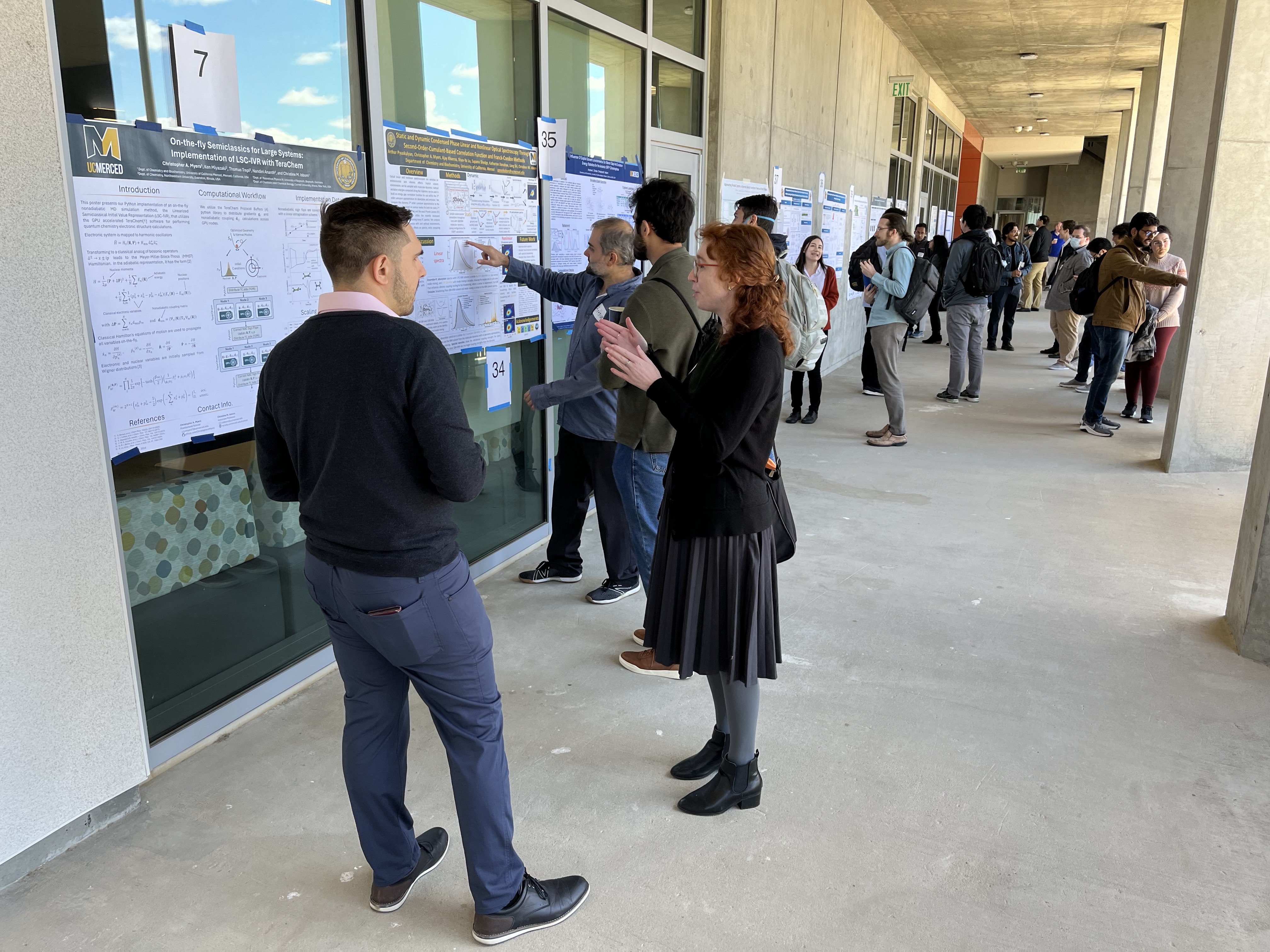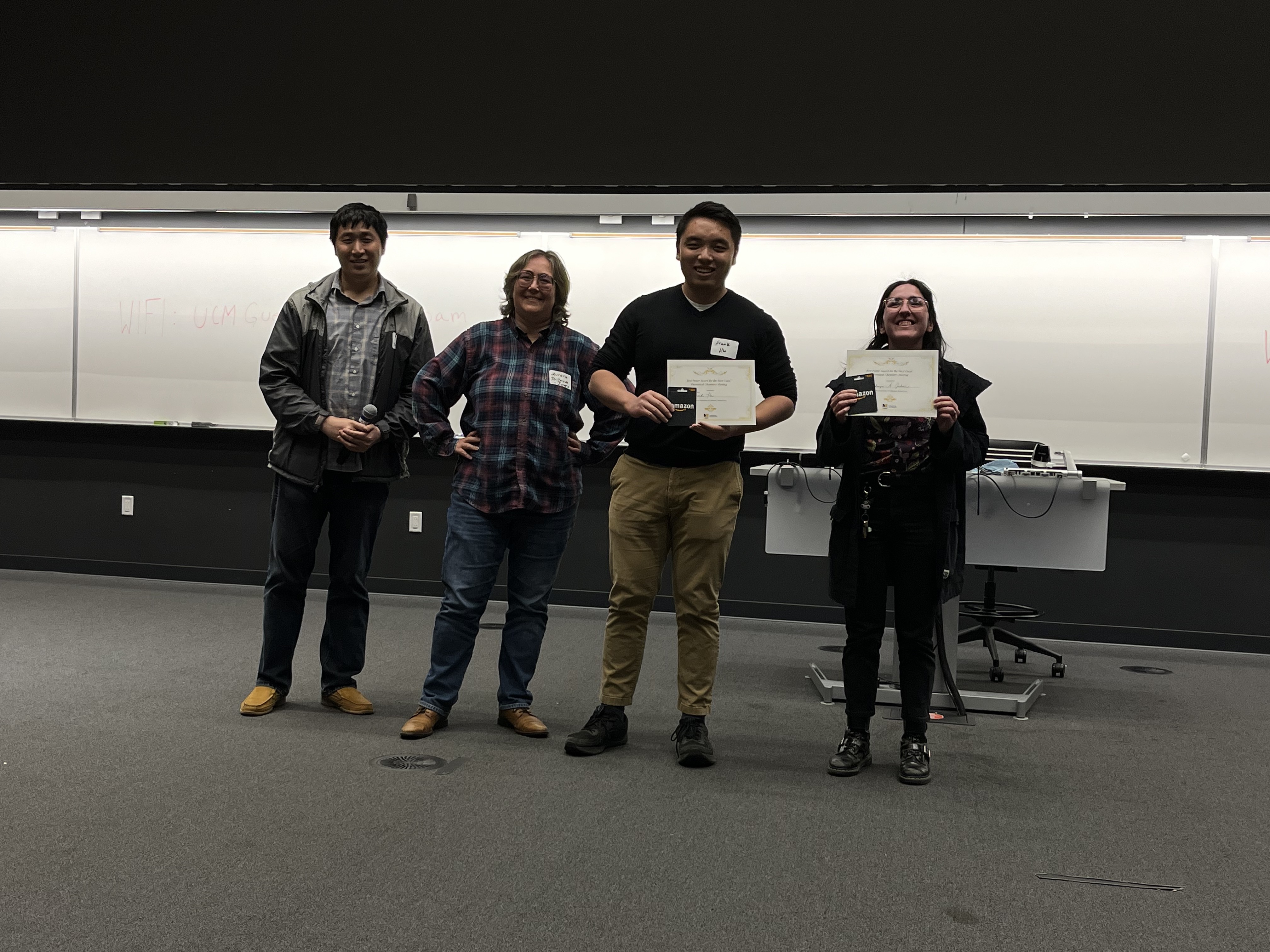UC Merced is hosting the next iteration of the West Coast Theoretical Chemistry (WCTC) meeting on Sunday, May 5th, on the UC Merced campus in Merced, CA. This one-day meeting aims to bring together graduate students, postdoctoral researchers, faculty, and national lab and industry scientists to discuss and present their research across all areas of theoretical chemistry in the form of talks and posters.
Best Poster Prize Winners
- Frank Hu, Michael S. Chen, Grant M. Rotskoff, Matthew W. Kanan, Thomas E. Markland, Department of Chemistry, Stanford University
"Accurate and efficient structure elucidation from routine one-dimensional NMR spectra using multitask machine learning" - Mackenzie Jackson (advisor: Kristi Closser), California State University, Fresno
"Computational Modeling of the Radical Formation of Pentane as a Plasma Precursor in Low Temperature Plasma"
Registration
- Registration and poster abstract submission is now closed.
- If you'd like to be considered for a contributed talk, please register and upload your abstract by April 22. Otherwise, please register and submit your poster abstract no later than April 26.
- Spreadsheet for attendees to self-organize carpooling (optional)
- For posters, a size 36" × 48" is recommended, but all sizes are acceptable.
Lodging
- A discounted rate of $145 (via this booking link (updated); must book by April 30) is available at the El Capitan Hotel in downtown Merced.
Invited Speakers
David Limmer (UC Berkeley): Taking chemistry far from equilibrium- Aurora Pribram-Jones (UC Merced)
- Dean Tantillo (UC Davis): Organic reactions with bifurcating reaction coordinates - What, why, why care?
- Xiao Wang (UC Santa Cruz): Periodic wavefunction methods for materials science
- Grant Rotskoff (Stanford): From coarse-grained models to conformational ensembles
- Ashley Ringer McDonald (Cal Poly San Luis Obispo and Molecular Sciences Software Institute): What can the MolSSI do for you? Resources, programs, and software from the Molecular Sciences Software Institute.
- Nicole Adelstein (San Francisco State University): Techniques for Multiscale Simulations of Solid-Solid Interfaces
Contributed Talks
- Diptarka Hait (Stanford University): Can excited states of radical ions act as photoredox catalysts?
- Chenchen Song (University of California, Davis): Simulating photoreactions in biological environments with state averaged CASSCF in AMOEBA polarizable models
- Siddharth Sonti (University of California, Davis): Elucidating the fluxionality and dynamics of zeolite-confined Au nanoclusters using machine learning potentials
- Imam Wahyutama (University of California, Merced): Conjugation and symmetry effects in ultrafast charge migration
Schedule
Abstract Book for Talks and Posters
Optional Tutorial
At the end of the day, there will be an optional tutorial on nanoHUB.org tools for hands-on pedagogical simulations, with the MIT Atomic-Scale Modeling Toolkit. The tools provide a simple GUI that can be used for class demonstrations and exercises for students with minimal computational knowledge, with approaches like Hartree-Fock, DFT, Monte Carlo, and molecular dynamics, including visualization of structures and wavefunctions. David Strubbe will present and guide hands-on activities. Creation of a free nanoHUB.org account in advance is recommended.
Organizers
Christine Isborn, Liang Shi, Aurora Pribram-Jones, Hrant Hratchian, Henrik Larsson, David Strubbe
Center for Chemical Computation and Theory (ccCAT) at UC Merced
Contact
Please direct inquiries via email to: Liang Shi (lshi4@ucmerced.edu) or chemistry@ucmerced.edu.
Getting to Merced
- Air: Advanced Air has flights from Las Vegas and Los Angeles (not LAX though) to Merced's tiny airport, a 20-minute drive from campus. Fresno airport (FAT) is 1 hour's drive away from Merced, and has flights from some major airports in the western half of the US, and Chicago O'Hare airport. San Francisco (the main international airport in the area), San José, Oakland, and Sacramento airports are all 2 hours' drive away. You can take the Amtrak train from Fresno and Sacramento, San Francisco, and Oakland. For Fresno and Sacramento airports, you'll need to take taxi/Lyft/Uber to the train station. For San Francisco and Oakland, you can take the BART commuter rail to Richmond, where there is an Amtrak station right next to the BART station. Amtrak (see below) from Richmond to Merced takes about 2 hours and 40 minutes, and there is generally no need to buy the ticket in advance as the price is fixed and the train rarely fills up. Check the schedule to be sure one of the train times works for you.
- Rail: There is an Amtrak station in Merced. Amtrak's San Joaquins line runs between Oakland and Bakersfield (with bus connections at each end to San Francisco, Los Angeles, and other California cities), and connects to Sacramento.
- Bus: You can take Greyhound.
- Within Merced: To get from the Amtrak station to campus, you can try Uber or Lyft, or a taxi service such as Merced Taxi.
- Driving: Merced is located just off Highway 99. See driving directions here. The Bay Area is about 2 hours' drive away (see above), and Los Angeles is about 5 hours' drive away.
Parking
- The Bellevue lot is recommended, which is closest to the ACS building. See map for this locations.
- Parking is free on weekends.
Location
- Weather: In May, high temperatures are typically around 80-90 F. Rain is rare.
- Campus (map) is about 15 minutes drive from downtown Merced.
- Campus address: 5200 N. Lake Rd., Merced, CA 95343.
- Virtual tour of campus
- Merced is known as the "Gateway to Yosemite," and Yosemite Valley is about 2 hours' drive away.
Previous years:
- 2023, University of California, Davis
- 2019, University of California, Berkeley (Northern California Theoretical Chemistry meeting)
- 2018, Stanford University






